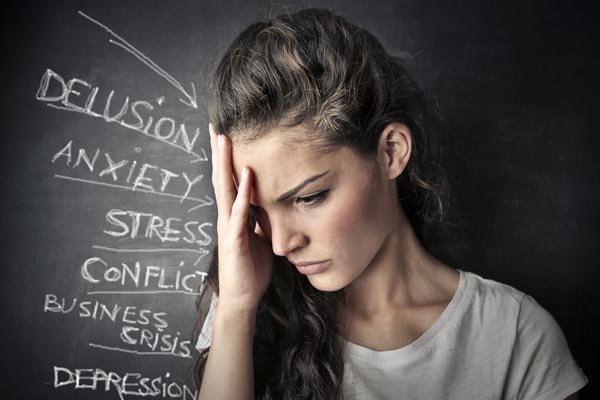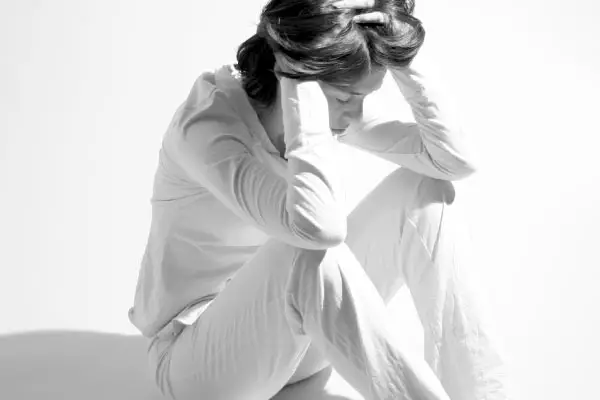
Anxiety occurring every now and then is part of life. If presented with a problem at work, you may feel a bit anxious about finding a solution. When you’re about to take a test, you may be a little anxious about how well you will do.
If you’re being presented with an important decision, you may worry that you won’t make the right one. These all involve normal, temporary anxiety and worry.
However, anxiety disorder is more than just a temporary fear and worry. Individuals with anxiety disorder have anxiety that never goes away and over time, can become much worse.
In some cases, these feelings interfere with their daily activities and performance at school/work and in relationships.
You must understand that anxiety disorders are a serious mental illness. Individuals with anxiety disorders often experience fear and worry that can be crippling.
There are several different anxiety disorders and together, they are the most common mental disorders. Anxiety disorders are the most common of the psychiatric illnesses that affect both adults and children.
Approximately 40 million Americans suffer from anxiety disorders. However, even though this is a highly treatable condition, only about one-third of individuals experiencing this disorder will seek treatment.
Types of Anxiety Disorders
There are four types of anxiety disorders that will be discussed in this article:
- GAD, or Generalized Anxiety Disorder
- Panic Disorder
- Social Phobia, or Social Anxiety Disorder
- Specific Phobias
Generalized Anxiety Disorder
Everyone worries about things such as family issues, money, and health. On the other hand, individuals with GAD are worried about all of these and more- even when there is no reason to be.
They are anxious about simply making it through their day. They’re always worried that something bad will happen and waiting for the other shoe to drop. In some cases, people with GAD are unable to perform their everyday tasks.
Panic Disorder
This form of anxiety disorder is diagnosed in those who have spontaneous panic attacks and are often preoccupied with a fear of having more. These attacks happen unexpectedly and can occur even when the individual is sleeping.
Social Anxiety Disorder
Almost everyone has a case of the nerves or feels self-conscious sometimes- especially when interviewing for a new job or giving a speech.
However, social anxiety disorder is much more than a simple case of the nerves or shyness. Social anxiety disorder is characterized by a fear of embarrassing yourself that is so intense that you try to avoid the situations that trigger it.
Specific Phobias
This condition is when an individual feels an extremely intense fear of a situation or an object. Most often, the fear is highly inappropriate to the threat level of the situation and many times, causes the individual to avoid everyday situations.
Signs and Symptoms of Anxiety Disorder
Of course, the signs and symptoms will vary based upon the type of anxiety disorder an individual has, but some of the general symptoms include:
- Feelings of fear, panic, uneasiness
- Difficulty sleeping (falling asleep or staying asleep)
- Cold/sweaty hands or feet
- Difficulty breathing
- Heart palpitations
- Dry mouth
- Nausea
- An inability to be calm and still
- Numbness/tingling in hands and feet
- Dizziness
- Muscle Tension
Causes of Anxiety Disorders
While the exact cause of an anxiety disorder is not understood at this time, one thing is for certain: you should be aware that, like other mental illnesses, an anxiety disorder is not a character flaw, poor upbringing, or a result of personal weakness.
As scientists research in the field of mental illnesses, they are finding that most of these disorders are actually a result of a combination of factors including changes in the chemicals in your brain and stress related to your environment.
Just as with other brain disorders, an anxiety disorder could be related to issues with brain functioning in the areas that regulate emotions, especially fear.
Some studies have revealed that severe, long-lasting stress can change the way your nerve cells transfer information from one area of your brain to another.
Some of the other studies have revealed that individuals who have specific anxiety disorder have a change in some specific structures of the brain that control memories that are linked with strong emotions.
Additionally, some studies have revealed that these types of disorders do run in families, which means that they are at least partly inherited from at least one- if not both- parents, just like the risk for cancer, heart disease, or other health problems.
Finally, there are specific environmental factors such as some sort of trauma or significant event that could trigger an anxiety disorder in those individuals that have an inherited predisposition to developing one.
Is Anxiety Disorder Common?
Yes, anxiety disorder is quite common, affecting millions of adults in America. In most cases, an anxiety disorder will begin early in life- as early as childhood or adolescence and even in early adulthood. These are usually more common in women than they are in men and occur equally across racial and ethnic lines.
Diagnosing Anxiety Disorders
If you have any of the above symptoms of anxiety disorders, you should see your physician to be diagnosed. He/she will start by asking you some questions about your medical history as well as taking the time to perform a full physical exam.
While there are no specific lab tests available to diagnose an anxiety disorder, your physician will use a variety of tests to rule out physical illnesses as a root cause of the signs and symptoms you are experiencing.
After testing, if no physical illness is found, your physician may recommend that you see a psychologist, psychiatrist, or other mental health professional.
These healthcare professionals have been specifically trained in the diagnosis and treatment of mental illnesses and will be much better equipped to help you.
Psychologists and psychiatrists will use assessment and interview tools that are specially designed to evaluate a patient for an anxiety disorder.
The physician will base his/her diagnosis on your description of the duration and intensity of your symptoms, including whether or not they are interfering with your daily functioning, as well as his/her observation of your behavior and attitude.
He/she will then determine whether or not your symptoms and degree of dysfunction are indicative of a specific anxiety disorder.
Treating Anxiety Disorders
Anxiety disorders are highly treatable, and most individuals with this condition will be helped with professional care.
Over the past few decades, there has been much progress in the treatment of individuals who have a mental illness, including anxiety disorders.
Though the specific disorder you are diagnosed with will determine the type of treatment used, one or a combination of the following will be used in most cases:
- Therapy
- Medication
- Complementary/Alternative Treatments
Of course, the success of treatment will vary from one person to the next. Some will respond to treatment after a few weeks or even months- but others will need a year or more of continuous treatment.
Treatment of this condition can be complicated if the individual also has depression, is abusing substances, or has another co-existing condition.
This is why it is critical that treatment be tailored for each individual- there is no “one-size-fits-all” treatment for anxiety disorder.
Therapy to Treat Anxiety Disorder
There are several types of therapy that are used to treat anxiety disorder including:
- CBT, or cognitive-behavioral therapy
- Exposure
- ACT, or acceptance and commitment therapy
- DBT, dialectical behavioral therapy
- IPT, or interpersonal therapy
- EMDR, or eye movement desensitization and reprocessing
Cognitive-Behavioral Therapy
CBT is a very well-established and highly effective treatment that lasts for the long-term. This type of therapy assist the individual in identifying, learning to understand, and changing their behaviors and thought processes. Of course, it depends upon the individual, but the benefits are usually seen in 12 to 16 weeks.
Exposure Therapy
This type of therapy is a form of CBT and is a process for helping the individual reduce their anxiety and fear responses. In each session, the individual is exposed to their fear and over time, they learn to be less fearful.
Acceptance and Commitment Therapy
This form of therapy uses strategies to help the individual learn mindfulness and acceptance along with behavior change and commitment in order to deal with their unwanted sensations, feelings, and thoughts.
This type of therapy will impart skills to accept experiences and make the commitment necessary to change your behavior.
Dialectical Behavioral Therapy
This form of therapy integrates techniques of CBT with some concepts from Eastern Meditation, combining both acceptance and change.
There is both individual and group therapy used to promote mindfulness, tolerating distress, teaching interpersonal effectiveness skills, and regulating emotions.
Interpersonal Therapy
This form of therapy is a short-term psychotherapy addressing interpersonal issues in adolescents through older adults. Typically, an individual will attend twelve to sixteen one-hour sessions.
The first few sessions will be devoted to getting information about the nature of the individual’s depression and interpersonal experiences.
Eye Movement Desensitization and Reprocessing
In certain conditions, eye movement appears to reduce the extremeness of these disturbing thoughts. One treatment, referred to as EMDR seems to have an effect on the way that the brain takes in information and processes it.
Put simply, it helps an individual see disturbing things in less distressing ways. This form of therapy seems to be very similar to what occurs during REM sleep. This is an effective treatment for PTSD, panic attacks, and even phobias.

Medications to Treat Anxiety Disorder
There are four major classes of medications that are used to treat anxiety disorders:
- SSRI, or selective serotonin reuptake inhibitor
- SNRI, or serotonin-norepinephrine Reuptake Inhibitor
- Benzodiazepines
- Tricyclic Antidepressants
Selective Serotonin Reuptake Inhibitors
This type of medication relieves the symptoms of anxiety disorder by blocking the reuptake/reabsorption of serotonin by specific nerve cells within the brain.
This means that there is more serotonin available, improving the individual’s mood. When compared with tricyclic antidepressants, SSRIs produce less side effects overall.
On the other hand, there are a few side effects associated with these such as: sleepiness/insomnia, weight gain, and sexual dysfunction. These are a very effective treatment for anxiety disorder, but individuals suffering from OCD will need higher doses.
Serotonin-Norepinephrine Reuptake Inhibitors
This type of medication is known for its dual mechanism of increasing the levels of norepinephrine and serotonin in the brain by inhibiting their reuptake/reabsorption into the cells of the brain.
As with any other medications, there are some side effects that you should be aware of including: headache, insomnia, sexual dysfunction, stomach upset, and a minor increase in blood pressure.
These are just as effective as the SSRIs, so are also considered a first-line treatment, especially in those who have generalized anxiety disorder.
Benzodiazepines
This type of medication is often used for short-term management of anxiety levels. These are very effective for promotion of relaxation and reduction in muscle tension as well as other physical symptoms of anxiety disorder.
Long term use might require an increase in dosage to achieve the very same effect, meaning that tolerance and dependence could result.
Tricyclic Antidepressants
Due to the fact that long-term use of benzodiazepines could lead to tolerance and dependence, physicians often favor tricyclic antidepressants.
While these are very effective for treating anxiety, these do bring with them some significant side effects, including: constipation, blurry vision, drop in blood pressure when standing, and dry mouth.
Any time you experience any new symptom, you should be sure to contact your physician- even if you’re not sure if it’s a side effect or not. Never stop taking a particular medication without contacting your physician.
Keep in mind that as long as you are taking them to the specifications of your physician, a medication will work. However, you may or may not be able to resolve all of your symptoms.
Complementary and Alternative Treatments for Anxiety Disorder
In recent years, the complementary and alternative treatments have soared in popularity. This is an approach to healthcare that is outside of conventional medicine that is practiced in the USA.
Most often, conventional medicine is used right along with these complementary treatments. For example, using aromatherapy to help ease the discomfort of the surgery recovery process.
On the other hand, alternative therapy is used in the place of conventional medicine, such as choosing to follow a specific diet to treat your cancer instead of undergoing chemo or radiation.
Following are some of the complementary and alternative treatments used for anxiety disorder:
- Stress/Relaxation Techniques
- Meditation
- Yoga
- Acupuncture
- Kava
Relaxation Techniques
For individuals with ongoing health issues such as IBD or heart disease, relaxation techniques have proven to be effective for providing modest, short-term reduction of the symptoms of anxiety.
In addition, relaxation techniques are also effective for those undergoing medical or dental procedures. Finally, older adults with anxiety have found relaxation techniques to be quite useful.
However, for individuals with generalized anxiety disorder, CBT has proven to be more effective over the long-term than relaxation techniques alone.
Meditation
There is some evidence that symptoms of both anxiety and depression in adults can be relieved by meditation. However, again, when used alone, this is not as effective as being used with other conventional forms of treatment.
Yoga
One of the top ten CAM practices is yoga, which includes a distinct philosophy along with meditation, breathing exercises, and physical postures.
There are some studies that suggest that yoga- along with other forms of exercise- can confer health benefits such as helping to reduce blood pressure and heart rate and well as alleviating depression and anxiety.
Acupuncture
Acupuncture is the Chinese practice of sticking needles into specific points on the body to manipulate energy flow. This has been proven effective for helping to control the symptoms of anxiety disorders.
Kava
This is a plant that is found in the South Pacific and has been proven effective and safe for treating the symptoms of anxiety and improving moods.
Typically prescribed in pill form, evidence has been found supporting kava extract as well as other natural treatments are very effective for treating generalized anxiety disorder.
Can You Prevent an Anxiety Disorder?
Please be aware that anxiety disorders are not entirely preventable. If you are at risk for developing one, there is nothing you can do to stop that.
However, there are things that can be done to help reduce and control your symptoms, such as:
- Reducing or ceasing consumption of products containing caffeine, such as chocolate, energy drinks, tea, cola, and coffee.
- Make sure that you speak with your physician or pharmacist before you start taking any OTC or herbal medications or remedies. These could possibly contain chemicals that will increase your anxiety or have harmful interactions with other treatments you are currently on.
- If you are having any recurring or chronic symptoms of anxiety disorder, you should seek counseling and support as soon as possible- especially if there is no obvious cause.
Anxiety disorders are common- so if you have one, you are not alone. There are others that are right there with you. Reach out for help and learn to manage your symptoms so that your quality of life is not greatly affected.
Sources:
http://www.nimh.nih.gov/health/topics/anxiety-disorders/index.shtml
http://www.adaa.org/understanding-anxiety/panic-disorder-agoraphobia
http://www.helpguide.org/articles/anxiety/social-anxiety-disorder-and-social-phobia.htm


Anxiety is a disorder I feel gets overlooked. Mental health-care seems to focus more on the other disorders and unless a person has the severe end of anxiety then they are brushed off as being stressed out. Your post breaks down the various forms of anxiety and gives a good explanation for each. The prevention tips are key! I will share this post.